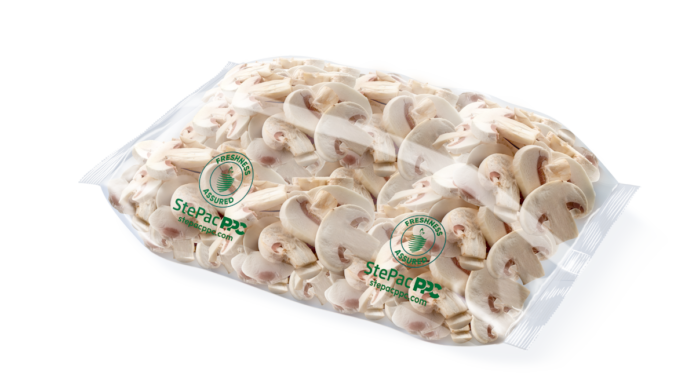Fresh produce packaging company StePacPPC has customized its modified atmosphere packaging (MAP) films to preserve fresh whole and sliced white mushrooms, and whole exotic mushrooms, such as oyster, lion’s mane, shiitake, portabella and more.
The lean MAP system fulfills what the company said is increased consumer demands for sustainable packaging that slows deterioration and dramatically reduces waste of this highly perishable item.
The appetite for mushrooms has been growing rapidly based on their health halo and being a vegan source of meaty umami flavor and texture. Yet mushrooms also tend to have a very short shelf life. Growers and shippers are constantly dealing with these challenges, striving to improve mushroom storage capabilities and curb waste.
Mushroom preservation
StePacPPC’s latest advancement in its packaging formats is designed specifically to maintain the freshness of whole and sliced white mushrooms, and whole exotic mushrooms. The customized films significantly slow down decay and reduce weight loss of costly culinary delicacies, preserving texture, nutrition, and flavor, which reduces a considerable amount of waste and cost.
Over the past decade, consumer demand for mushrooms has surged, with more exotic species entering the mainstream. According to data by Emergen Research, the global mushroom market size is valued at more than $50 billion. This is expected to more than double by 2030.
The highly perishable nature of mushrooms, and the challenges of maintaining their shelf life, has prevented the realisation of their full market potential.
“Mushrooms have high metabolic activity and respiration rates which gives them a short shelf life, typically just a few days,”said Gary Ward, CTO at StePacPPC.
“They also generate a lot of moisture during the respiration process, which encourages bacterial decay. On the other hand, they are also prone to dehydration which causes them to shrivel, and they become discolored due to oxidation. Sliced mushrooms are even more susceptible to a rapid decline in quality.”
The company said the high water-vapor transmission rate of StePacPPC films, coupled with the customised modified atmosphere properties, are useful in preserving the quality of both whole and sliced mushrooms, slowing respiration and aging, reducing dehydration, and expelling excess moisture from the packaging.
“In post-harvest lab and field trials, our films have demonstrated abilities to maintain the freshness and wholesome appearance of mushrooms,” Ward said.
“This effectively stretches their shelf life from just a few days to more than two weeks, generating meaningful reductions in food waste.”
StePacPPC’s packaging first demonstrated its potential for mushroom preservation during the Covid pandemic. Oyster mushroom farmers had excess produce due to the logistical standstills. StePacPPC’s Xtend bulk packaging solutions helped prolong storage in the cold storage, effectively mitigating waste.
Since then, the company has developed Xtend bulk packaging solutions for lion’s mane, shiitake and portabella mushrooms.
Waste reduced by more than 35%
Roni Sofer, VP of marketing for Marina Galilee Mushrooms, Ltd., a market leader in Israel, said the company has preserved the freshness of its products for more than 10 days and waste in the supply chain has reduced by more than 35%.
More recently, StePacPPC and its longstanding partner, Windham Packaging, LLC, completed the adaptation of its Xflow™ brand of roll-stock films for automated packing to meet the specific preservation needs of bulk fresh sliced white mushrooms.
StePacPPC’s newest Xflow solutions already are gaining momentum in North America, where they are preserving the quality of bulk-packed sliced mushrooms for foodservice outlets such as restaurants and hotels.
“We use the Xflow solution for packing our sliced mushroom and preserving the quality during shipping to food service customers. The results have been impressive, and overall, the packaging system preserved the freshness for as long as 18 days,” said Fred Recchiuti of Basciani Foods, a supplier of mushrooms for retail and the food service industry in the US.
“The tamper-proof bag increases food safety, security, and eliminates the possibility of foreign materials entering the product in the supply chain. For sustainability, it reduces the product’s plastic use by more than 94.7% versus the tubs we used to use.”
The packaging formats can be produced with 30% recycled material to support a circular economy.
Jim Cornall is editor of Future Food Today and publisher at Ayr Coastal Media. He is an award-winning writer, editor, photographer, broadcaster, designer and author. Contact Jim here.






